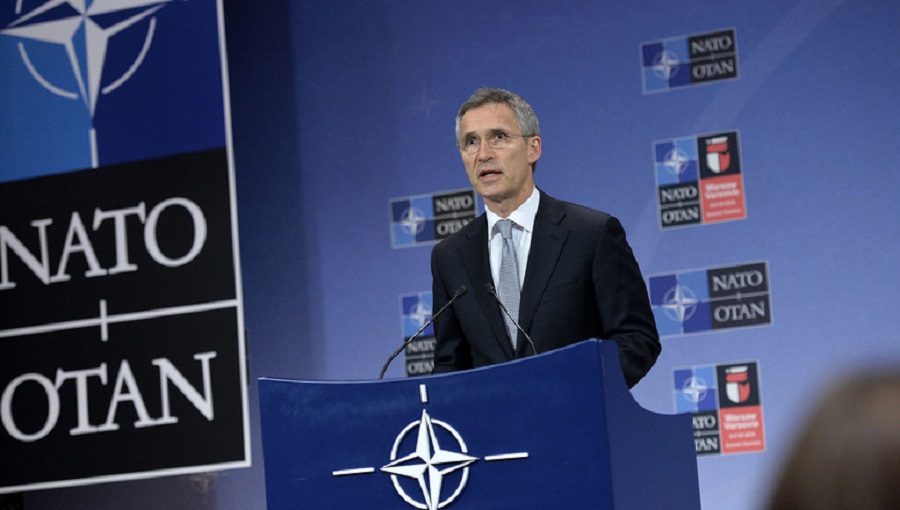NATO and Russia: Balancing defence with dialogue
___________________________________________________________________________________________________________
Opinion piece by NATO Secretary General Jens Stoltenberg
19 Jul. 2016
European security is being challenged on many fronts. In the last week alone, we have seen another devastating terrorist attack in France and a failed coup attempt in Turkey. The threats posed by terrorism and instability are real and all NATO Allies are working together to keep our people safe.
But there is another challenge: a challenge from a more assertive Russia, especially following the illegal annexation of Crimea. I believe a key way to enhance our long-term security in Europe is to engage in meaningful dialogue with Russia, NATO’s largest and most powerful neighbour. That is why we held another meeting last week of the NATO-Russia Council. It is also why NATO leaders at our recent summit in Warsaw reconfirmed our balanced, two-track approach to Russia: strengthening our collective deterrence and defence, while at the same time remaining committed to meaningful dialogue.
NATO has a long history of trying to build a cooperative relationship with Russia. In 1991, as the Soviet Union collapsed, NATO looked to move beyond the old Cold War rivalry.
In 1994, NATO launched the Partnership for Peace programme. Russia was the first country to join. The NATO-Russia Founding Act followed just three years later. In signing this landmark agreement, NATO and Russia expressed their determination to “build together a lasting and inclusive peace in the Euro-Atlantic area on the principles of democracy and cooperative security.” Both sides agreed not to use force against each other or any other state; to respect the sovereignty, independence and territorial integrity of all states; and to settle disputes peacefully. Russian troops operated alongside NATO in both Bosnia and Kosovo to resolve conflicts there.
Progress continued into the new century. In 2002, NATO and Russia established the NATO-Russia Council (NRC) to enhance “our ability to work together in areas of common interest and to stand together against common threats and risks to our security.” The NRC facilitated greater cooperation in a wide range of areas, including counter-terrorism, crisis management, arms control and theatre missile defence. In 2010, NATO and Russia agreed to move toward a true strategic partnership. Over the following years, we worked together in Afghanistan, conducted counter-piracy and submarine exercises, and discussed a joint military mission to help dispose of Syria’s chemical weapons.
Then everything changed. In 2014, Russia used force to illegally annex Crimea and has continued to destabilize eastern Ukraine. In doing so, Russia has violated international law and undermined the European security order. These aggressive actions have triggered a robust response from the international community. The European Union, the United States, and others have imposed tough economic sanctions. Russia was suspended from the G8. And over the past two years NATO has delivered the biggest reinforcement of its collective defence in a generation.
Collective defence is NATO’s primary responsibility. Our nearly one billion people expect that we will keep them safe. To further boost our security, NATO leaders agreed last week in Warsaw to enhance our military presence in the eastern part of the Alliance. We will deploy four multinational battalions in Estonia, Latvia, Lithuania and Poland on a rotational basis. These forces will make clear that an attack on one Ally will be met by forces from the whole Alliance. And we agreed to increase our presence in south-eastern Europe, based on a multinational brigade in Romania.
Some fear these measures are leading toward a tit-for-tat escalation with Russia. I understand those concerns, but I do not share them. We want to prevent conflict, not to provoke it. All of NATO’s measures are defensive, proportionate, transparent and fully in line with our international obligations. NATO is and will always be a defensive alliance. The core of our strengthened defence posture is aimed at countering security threats from all directions. NATO poses no threat to Russia or to any other country. We do not seek confrontation or a new arms race. The Cold War is history and it should stay history.
Despite our differences, it is essential that we engage constructively with Russia. After all, Russia is a permanent member of the United Nations Security Council. Russia cannot and should not be isolated. Russia can play a constructive role in world affairs, as shown by the Iran nuclear agreement and the destruction of Syria’s chemical weapons.
Dialogue with Russia is important to promote strategic stability, predictability and transparency. We need dialogue to clearly communicate our intentions, our initiatives and our expectations to Russia, and vice versa. We need dialogue to reduce the risk of incidents and accidents spiralling out of control. The downing of the Russian fighter plane over Turkey last year underlines how urgent this is. And I welcome the fact that Russia has signalled that it wants to pursue confidence building measures to improve air safety.
Dialogue is also important for communicating and reinforcing clear principles and international norms of behaviour, like the sovereignty of nations and the sanctity of internationally recognized borders. These values are fundamental for European security. That is why NATO will never accept Russia’s illegal annexation of Crimea and why we fully support Ukraine’s sovereignty and territorial integrity.
NATO and Russia should talk with each other and not past each other. The NATO-Russia Council provides a useful forum for meaningful dialogue. It also offers a potential platform for forging a more cooperative relationship, when Russia’s actions make that possible.
Given the complex and challenging security environment we face today, I believe NATO’s two-track approach toward Russia is the right one. We need more defence and more dialogue. NATO is delivering both.
* * * * *
The author is NATO Secretary General Jens Stoltenberg. This opinion-editorial was published in newspapers belonging to LENA (Leading European Newspaper Alliance)
Zdroj textu a ilustračné foto: http://nato.int/cps/en/natohq/opinions_134210.htm







